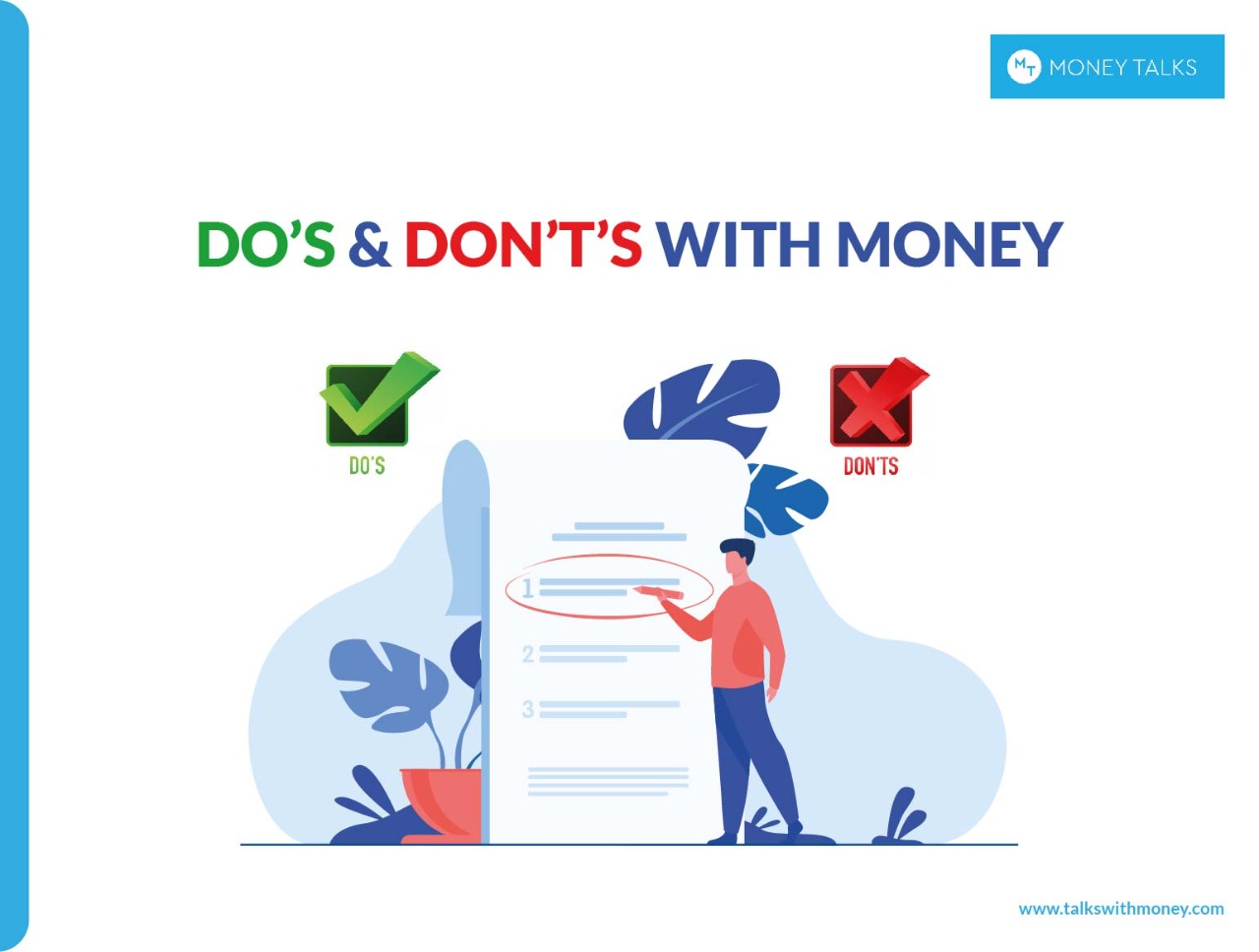Do’s and Don’t’s with Money
Money has become a formidable force in our lives. It has controlled us ever since we knew of its power. But there are ways to tame this power if we discipline ourselves to the do’s and don’t’s of it and set a goal before/while investing.
This willful change in money habits on our part will not only save money but will help us enter that path to investments and eventually lead us toward wealth creation- our final destination.
Below listed are three do’s and don’t’s each when handling cash.
Let’s begin with the DO’s.
- Minimal use of credit cards: Many of us these days earn 6-digit figures that make us easily liable to credit card offers from banks. This can be a trap to lure you into the world of spending. Of course it does come with its conveniences, benefits and reward points but the bigger picture is that you will develop a spending habit. That is not where you want to be when you’d rather use your income to save or invest elsewhere.
Also, there is this additional payment of a 2% interest per month in case of delayed bill payments. If you do the math, you’ll see it is 24% per annum which is a very high interest rate if you were to fail paying bills regularly. Is this what you want to be doing with your hard earned money? Think about it !
- Avoid buying properties through loan: Zero percentage loan payment is the new normal in the banking industry. This entices people into buying white goods (like washing machines, mobile phones etc) through EMIs. Now the downside to this is that if you were to make payment through EMI rather than with cash, you are missing the discount of 10-20% on the M.R.P which you’d have received otherwise. Also and more importantly, this method of buying items when you don’t have the cash while you have the convenience of a loan will only add to your spending habit.
The concept of leverage doesn’t profit you. All you earn from leverages is DEBT. After all, you’ve borrowed money. There will be payback time. Why go after DEBT when be content with buying items with REAL earned money like in the good old times?
- Buy within your affordable means:
This is very much in relation to our previous point. Simply put, it means if you don’t have the cash to buy that house then you just don’t buy it. If you don’t have the cash to buy that car then you just don’t buy it. If you don’t have the cash to do that trip then you just don’t do it. Sometimes the old fashioned way is the best way to stay clear of debt.
The Do’s.
- Keep a journal of your expenses and income: Keeping track of your money’s journey is essential so you know where you stand in the larger scheme of things. You can either use journals or do it digitally. Several mobile phone apps are available for such purposes. Stay in touch with your money on a weekly/monthly basis.
Also, when you do note down your expenses for the day, keep aside columns that classify the nature of your spending- was it a need or a want? This further aids in providing you clarity on your financial status.
To give an instance, smoking cigarettes on a daily basis is also consumption of your money. How many packs do you smoke a day? How much does each pack cost? How many packs can you cut down in a day so you save a certain amount per month? For a year? Go do the math and you’ll see the difference.
- Create a Budget: Plan out your cash flow and see that you spend within the budget you’ve created for yourself. For your money. No LOANS. No CREDIT CARDS. No DEBT.
- Keep all your Savings and Investments automated: You can always leave a standing instruction with your bank on transferring funds to a not-so-active bank account of yours or a Mutual Fund or SIP scheme (Systematic Investment Planning) for investment and saving purposes.
If saving a part of your monthly income for a short term is what is on your mind then liquid fund asset classes are a good scheme to look into for a period of 6 months to a year. It is a highly secured form of investment.
But if you are looking at long term investment schemes of 5 years and beyond, you can always count on equity based asset classes. Patience is a virtue in these matters. Making quick money isn’t the same as making real money.
So, to keep it disciplined you can segregate the monthly automated amount into savings and investment. This will give you a better idea on your financial status when you want to check upon it.
Following these Do’s and Don’t’s seem like a hard task, almost impossible in this day and age. But let’s assure you that it is anything but that.
Keep yourself financially disciplined and you shall reap the benefits of the change you’ve made.

